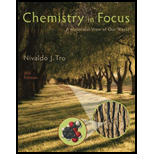
Interpretation:
Whether the concentration of lead in the given sample of water can be decreased by boiling, or not, is to be explained.
Concept Introduction:
Water gets polluted due to the presence of various biological and chemical contaminants in it. Biological contaminants include microorganisms such as Giardia, Legionella while chemical contaminants are mercury, lead, benzene, trichloroethylene etc. Both these render water unfit for consumption by human beings and animals, if the contaminant exceeds a certain limit, termed as Maximum Contaminant Limit.
The concentration of a contaminant is reported as the mass of contaminant (in milligrams) present in one liter of water.
Hard water is a solution of calcium and magnesium salts in water. Presence of calcium and magnesium ions makes water hard and renders it unusable for various purposes, such as cleaning clothes and utensils, bathing and in water heaters etc.
Boiling of water cannot get rid of contaminants because this decreases the total volume of the sample of water but the mass of contaminant remains same. Moreover, the concentration of contaminant increases.
Want to see the full answer?
Check out a sample textbook solution
Chapter 12 Solutions
Chemistry In Focus
- A solution is made by adding 50.0 mL of ethanol (C2H5OH, d = 0.789 g/mL) to 50.0 mL of water (d = 0.998 g/mL). What is the total vapor pressure over the solution at 20 C? (See Study Question 75.) The vapor pressure of ethanol at 20 C is 43.6 mm Hg.arrow_forwardDescribe, on both a microscopic and a macroscopic basis, what happens to a sample of water as it is cooled from room temperture to 50Cbelow its normal freezing point.arrow_forwardThe solubility of lead nitrate at 100C is 140.0 g/100 g water. A solution at 100C consists of 57.0 g of lead nitrate in 64.0 g of water. When the solution is cooled 10C to 25.0 g of lead nitrate crystallize out. What is the solubility of lead nitrate in g/100 g water at 10C?arrow_forward
- Consider two hypothetical pure substances, AB(s) and XY(s). When equal molar amounts of these substances are placed in separate 500-mL samples of water, they undergo the following reactions: AB(s)A+(aq)+B(aq)XY(s)XY(aq) a Which solution would you expect to have the lower boiling point? Why? b Would you expect the vapor pressures of the two solutions to be equal? If not, which one would you expect to have the higher vapor pressure? c Describe a procedure that would make the two solutions have the same boiling point. d If you took 250 mL of the AB(aq) solution prepared above, would it have the same boiling point as the original solution? Be sure to explain your answer. e The container of XY(aq) is left out on the bench top for several days, which allows some of the water to evaporate from the solution. How would the melting point of this solution compare to the melting point of the original solution?arrow_forwardIn the distillation of a pure substance (e.g., water), why does all of the water not vaporize at once when the boiling point is reached?arrow_forwardSamples of each of the substances listed below are dissolved in 125 g of water. Which of the solutions has the highest boiling point? (a) 3.0 g sucrose, C12H22O11 (b) 1.0 g glycerol, C3H3(OH)3 (c) 1.0 g propylene glycol, C3H6(OH)2 (d) 2.0 g glucose, C6H12(OH)2arrow_forward

 Introductory Chemistry: A FoundationChemistryISBN:9781337399425Author:Steven S. Zumdahl, Donald J. DeCostePublisher:Cengage LearningChemistry: Matter and ChangeChemistryISBN:9780078746376Author:Dinah Zike, Laurel Dingrando, Nicholas Hainen, Cheryl WistromPublisher:Glencoe/McGraw-Hill School Pub Co
Introductory Chemistry: A FoundationChemistryISBN:9781337399425Author:Steven S. Zumdahl, Donald J. DeCostePublisher:Cengage LearningChemistry: Matter and ChangeChemistryISBN:9780078746376Author:Dinah Zike, Laurel Dingrando, Nicholas Hainen, Cheryl WistromPublisher:Glencoe/McGraw-Hill School Pub Co Chemistry: Principles and PracticeChemistryISBN:9780534420123Author:Daniel L. Reger, Scott R. Goode, David W. Ball, Edward MercerPublisher:Cengage Learning
Chemistry: Principles and PracticeChemistryISBN:9780534420123Author:Daniel L. Reger, Scott R. Goode, David W. Ball, Edward MercerPublisher:Cengage Learning Chemistry: The Molecular ScienceChemistryISBN:9781285199047Author:John W. Moore, Conrad L. StanitskiPublisher:Cengage Learning
Chemistry: The Molecular ScienceChemistryISBN:9781285199047Author:John W. Moore, Conrad L. StanitskiPublisher:Cengage Learning





